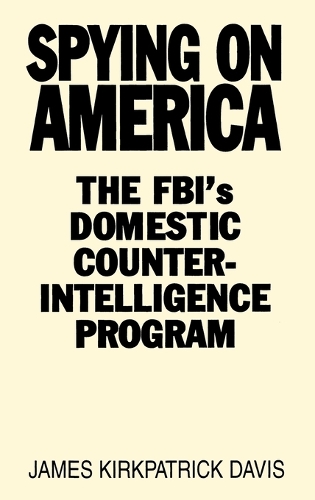
Spying on America: The FBI's Domestic Counterintelligence Program
(Hardback)
Publishing Details
Spying on America: The FBI's Domestic Counterintelligence Program
By (Author) James Kirkpatrick Davis
Bloomsbury Publishing PLC
Praeger Publishers Inc
24th February 1992
United States
Classifications
Tertiary Education
Non Fiction
Police and security services
Pressure groups, protest movements and non-violent action
327.1273
Physical Properties
Hardback
208
Width 156mm, Height 235mm
425g
Description
Exploring all five COINTELPRO operations, this work chronicles the period when the FBI monitored - and in many cases disrupted - virtually the entire social and political protest movement in America. COINTELPRO, an acronym for Counterintelligence Programme, directed its efforts against the Communist Party, the Socialist Workers Party, the Klu Klux Klan, black nationalist hate groups, and the New Left movement. From 1956 until COINTELPRO's exposure in 1971, the FBI expanded its domestic surveillance programmes and increasingly employed questionable, even unlawful methods. Davis demonstrates how the system of checks and balances designed to prevent such occurrences was simply not functioning - until an illegal act uncovered the secret activities.
Reviews
Davis--coauthor of Kelley (1987), the autobiography of former FBI director Clarence M. Kelley--delves into the FBI's secret counterintelligence program (COINTELPRO), which from 1956 to 1971 aimed to stifle dissent among domestic radical groups. J. Edgar Hoover, Davis explains, obtained a vast charter for the FBI to monitor domestic intelligence when FDR signed a special directive just prior to WW II, and managed to get the National Security Council to expand the FBI's portfolio in this arena in 1956. The author documents the Bureau's war against extremist groups of both the left and the right, such as the Communist Party U.S.A., the Socialist Workers Party, the KKK, and the Black Panthers, and shows how Hoover also employed extensive surveillance against New Left organizations like SDS. He pays particular attention to the FBI's virtually obsessive campaign to destroy the reputation of Martin Luther King. The lid was blown on these activities when, in 1971, an illegal break-in occurred at the FBI's Media, Pennsylvania, office. The perpetrators, believed to be anti-Vietnam War activists, proceeded to release to the press stolen classified documents that revealed the FBI's secret operation. To research his text, Davis interviewed FBI agents, former agents, and people who were subject to illegal surveillance or harassment. He recognizes the need for an organization like the FBI, but argues that the Bureau got out of control with COINTELPRO and severely damaged American civil liberties in the process. And Davis notes that, although congressional committees investigated the FBI in the mid-1970's, the Bureau was still committing abuses in the 1980's, particularly against groups opposed to US policy in Central America. A fair-minded and balanced report, backed by extensive research. * Kirkus Reviews *
The work's merit is that its descriptions of the bureau's brutal methods and of the real people whose lives were affected and some-times destroyed by Hoover's secret policy may shock the undergraduate or general reader into serious consideration of the problem of civil liberties in this country. * Journal of American History *
Aided by the declassification of many internal FBI documents and his relationship with former director Clarence Kelley, with whom he cowrote Kelley: The Story of an FBI Director, Davis provides information on FBI operations to watch, disrupt, and control the activities of groups (on the left and the right) that were perceived as being dangerous. One theme running through his book is how the FBI was able to use the news media to further its aims. Although these programs were instituted under Franklin D. Roosevelt, the paranoia of the late J. Edgar Hoover was a strong force behind them. Full of interesting details, Davis's book is more focused than Athan Theoharis's similarly titled Spying on Americans: Political Surveillance from Hoover to the Houston Plan, or Joan Jensen's Army Surveillance in America, 1775-1980. Suitable for the intelligence/criminal justice collections of all libraries. * Library Journal *
. . . an informative account of the FBI's domestic surveillance activities . . . The author summarizes in individual chapters five COINTELPRO operations, giving clear pictures of the crude but apparently effective techniques used against the American Communist Party, the Socialist Workers' Party, white hate groups such as the Klu Klux Klan, radical African American organizations like the Black Panther Party, and the New Left movement, comprised primarily of antiwar activists. * Publishers Weekly *
a great record on this shameful episode in intelligence history. * Outpost 2 *
Author Bio
JAMES KIRKPATRICK DAVIS is President of Davis Advertising Agency Inc. in Kansas City, Missouri. A student of American history for 30 years, Mr. Davis worked directly with Clarence Kelley, former Director of the FBI, as co-author of the book Kelley: The Story of an FBI Director.
